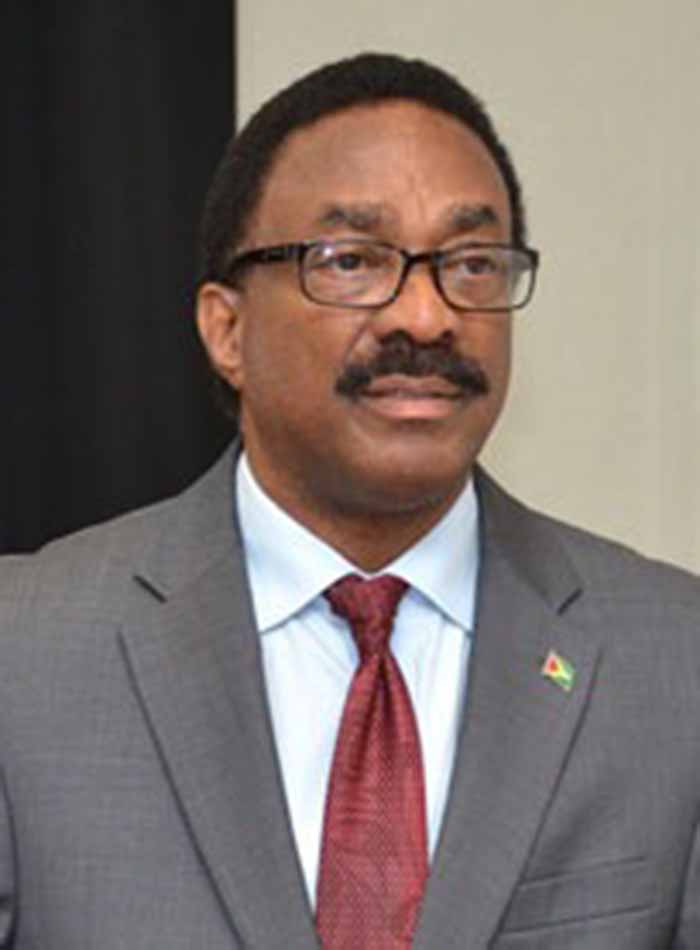Dissatisfied with the finding of High Court Judge Priya Sewnarine-Beharry, that he had slandered his then predecessor Anil Nandlall SC over allegations of law reports being stolen from the AG’s Chambers, now former Attorney General Basil Williams SC is seeking to set aside the $10m judgment awarded to Nandlall.
In his appeal, Williams is contending that the judge made a number of legal errors and as a result misdirected herself when she arrived at the findings she did.
In her ruling delivered on June 30th, Justice Sewnarine-Beharry said it was clear that Williams intended to, among other things, label Nandlall a thief; which was defamatory to him.
Citing a plethora of case law authorities, and in deference to video recording evidence and published news articles, the judge said that “the inescapable conclusion is that the words published by Williams meant, and could only mean, in their natural and ordinary meaning that Nandlall is dishonest; is a thief; committed the criminal offence of larceny; stole property of the State; stole law books; is unfit to be a member of the legal profession; is unfit to be a Member of Parliament; is unfit to be a public figure and a potential leader.”
The judge had then gone on to say “it was the considered view of this Court that the Claimant has established on a balance of probabilities that the Defendant published the defamatory words complained of.”
In his challenge filed with the Guyana Court of Appeal, Williams is arguing that the trial Judge misdirected herself when she held that Nandlall had established on a balance of probabilities that he (Williams) had published the words complained of.
According to him, Justice Sewnarine-Beharry erred in finding generally that the words complained of were defamatory, “without assessing what words precisely were so defamatory.”
A further error Williams contends the Judge made, was when she “failed or omitted” to make a finding on what the precise words were, which he is alleged to have spoken at various forums referenced.
According to Williams, at no time had he made any defamatory statements about Nandlall.
In fact, he is arguing that some statements made at a particular forum and alleged to be defamatory, amount to hearsay at best and therefore inadmissible and ought to be struck out.
He further contends that Nandlall, upon “recognizing the improbability of proving” that he (Williams) defamed him during two referenced press conferences, sought to then introduce in evidence belatedly by five years, a video recording which had no relation to the complaints made in his case.
Williams’ position is that Justice Sewnarine-Beharry erred in failing to consider this and also to ascertain the authenticity of that video, which he said “was generated by AI (artificial intelligence) voice cloning technology and photo-shopping internet technology” to prejudice him (Williams).
Williams argues that his evidence was not properly assessed by the trial judge and the recording admitted was prejudicial to him; stating that the trial Judge’s decision was against the weight of the evidence.
According to him, the Judge erred in striking out paragraphs of what he said were admissible evidence in his witness statement.
Williams says that the trial judge erred in law and misdirected herself when she failed to apply the correct principles in determining the award of damages.
The former AG is contending that “the errors and misdirections” on the part of the Court, amounted to him being denied his constitutional right to a fair hearing; even as he argued that he was not afforded adequate time to conduct his defence.
Justice Sewnarine-Beharry had noted in her ruling, that applying the principles laid down in legal authorities, the Court had to give the various publications complained of by Nandlall; their natural and ordinary meanings to examine whether they were capable of conveying to the ordinary reasonable reader, what would amount to the slander.
She so found.
She then went on to find that Williams could not rely on the defences of justification and fair comment which he raised.
On this point she noted in her ruling that while Williams denied that he published the words complained of; but admitted to only saying that Nandlall “could be prosecuted for larceny of the Commonwealth Law Reports”, there was evidence to prove otherwise.
The Court on this point placed heavy reliance on the video recording tendered into evidence, which Justice-Beharry said showed Williams “uttering the defamatory statements,” in an interview with the press.
Background
In his action against Williams, Nandlall was seeking damages in excess of one hundred and twenty-five million dollars.
The lawsuit stemmed from allegations made by Williams about Nandlall’s acquisition of Commonwealth Law Reports while he served as the Attorney General under the PPP/C government.
The criminal charges against Nandlall were discontinued on October 16th, 2020 upon the directions of the Director of Public Prosecutions (DPP).
Nandlall was charged and placed before the Magistrates’ Court with fraudulently converting over $2 million in the reports.
The charge against Nandlall before the lower court was that between May 8th, 2015 and May 29th, 2015, at Georgetown, being a bailee and Attorney General and Minister of Legal Affairs and having 14 Law Reports of the Commonwealth, valued at $2,313,853 and property of the Ministry, he fraudulently took or converted them to his own use and benefit.
Back in November of 2017, Justice Sewnarine-Beharry threw out Nandlall’s defamation suit, owing to his attorneys not keeping case-management dates set by the court, in accordance with the Civil Procedure Rules.
Nandlall had, however, said that Williams’ victory would be short-lived, signalling that he would appeal; arguing that the case was not determined on its merits.
He had told this newspaper that he would be appealing the matter because extensions of time in similar circumstances are granted regularly by judges.






